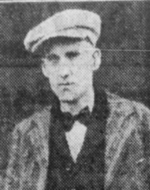 The Greenville News (Greenville, SC) 1/19/1931 On September 5, 1929, Jack Cotts, a gas station operator near Moundsville, West Virginia, was robbed of about $57 cash when he was locking up his filling station around 11 p.m. A man and a woman pulled up asking for gas and when Cotts went in the station room to get change, the couple followed him and held him up by each carrying a revolver. When they fled, Cotts grabbed his revolver and emptied shots at the quickly retreating car but could not stop them. Cotts reported the holdup immediately to police, but no one was captured that night. The Wheeling Register reported the next day that the car was a dark Buick sedan. However, when Cotts appeared later before the Grand Jury, he testified that he did not see what kind of car the robbers were driving. He only testified that it was a dark-colored, two-seated, closed car. It is not clear how Frank and Norma Howell ended up there, but on September 12, 1929, they were taken into custody and put in the New Martinsville jail, charged with the robbery of Cotts’ filling station. Cotts went to Martinsville and positively identified them as the bandits. Prosecuting Attorney J. Lloyd Arnold began preparing for what appeared to be a fairly simple case in view of the positive identification by Cotts and the definite way in which he recalled the facts. Although the Howells absolutely denied any knowledge of the holdup or having been near the Cotts place, they were jointly indicted by a Grand Jury in Marshall County and brought to trial before Judge James F. Shipman in the Circuit Court of Marshall County on November 4, 1929. The court appointed J. B. Rickey and John M. M. Fitzsimmons of Moundsville to defend them. Upon motion of counsel, separate trials were granted, and Frank Howell was tried first. The exact identification of the cars owned by Howell was not developed since the prosecutor’s case rested upon Cotts’s positive identification of Howell and not the car which fled from the scene of the crime. Cotts testified that he had no trouble at all identifying Howell and his wife. The defense presented several alibis for the Howells. Both Howells testified that on the day of the holdup, Frank was assisting George Coburn to move and after returning home around 7 p.m., he remained home with Norma. George Coburn corroborated this by testifying that he had called upon the Howells between 8:00 and 9:00 that evening to discuss some business. Clarence Lehew, Norma’s former husband, had taken their three children to the movies and returned with them that evening. They all corroborated that none of the family left the house that evening after they returned. Both of the Howells denied ever having seen Cotts prior to their arrest and knowing anything about the gas station. Howell denied even owning a revolver. However, Prosecutor Arnold was able to present enough testimony and evidence during cross-examination to convince the jury to return a verdict of guilty. Judge Shipman sentenced Howell to the maximum penalty of fifteen years. On November 6, 1929, Norma Howell was tried before a second jury on the same charge and the same testimony, but was acquitted despite Cotts’ positive identification. As she was leaving the Marshall County Courthouse, she was arrested on a charge of robbery at an inn in Cadiz, Ohio, fitting the description once again of “a tall, slim man and a short, stout young woman.” After refusing to go voluntarily to Ohio, she was extradited, indicted and tried in the Harrison County Court of Common Pleas. She was later acquitted and returned to West Virginia. Then, in a sudden turn of events, Irene Crawford Schroeder and Walter Glenn Dague, two notorious convicts awaiting execution in Pennsylvania for the murder of Highway Patrolman Brady Paul, confessed on January 5, 1931, that they had committed the robbery at the Cotts filling station, as well as the one in Cadiz. Upon viewing Schroeder and Dague, Cotts confirmed that they were the individuals who had robbed him. On January 14, 1931, Governor George Conley granted Frank Howell a pardon. Chauncey D. Hinerman introduced a bill in the West Virginia House of Delegates providing for compensation for Howell in the sum of $1,000. The bill passed the House, but failed to receive action by the Senate Finance Committee prior to adjournment of the 1931 Legislature. – Researched by Stan Matthews
|